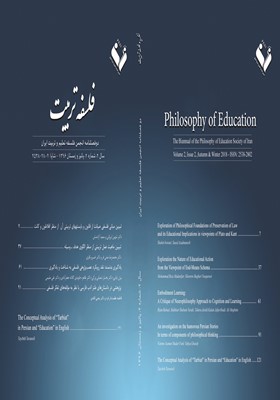The Conceptual Analysis of “Tarbiat” in Persian and “Education” in English
محورهای موضوعی : تاریخ و ماهیت رشته فلسفهٔ تعلیموتربیت، مکاتب و رویکردهای فلسفهٔ تعلیموتربیت قدیم و جدید ،تاریخ اندیشه و عمل تربیتی (سیاستها، برنامهها، اقدامات و...) مفاهیم، گزارهها و نظریههای تربیتی آراء مربیان و فیلسوفان تربیتی روششناسی پژوهشهای تربیتی انواع تربیت مسائل تعلیموتربیت ایران و جهان برنامه درسی و آموزش در رشتههای گوناگون
1 -
کلید واژه: Analysis, Concept, Education, Tarbiat ,
چکیده مقاله :
This article aims to consider and compare some concepts in Persian having the closest meanings to the concept of “education” in English. The main concept is “tarbiat”. The method of research is conceptual analysis for denoting some similarities and differences between the terms “tarbiat” and “education” in terms of etymological meaning, ordinary language, conceptual change, and contemporary usages. The results shows that both "education" and "Tarbiat" imply spiritual and physical development in etymological meaning; "Tarbiat" like "education" is a fluid word and has had some changes in its meaning from the past to the present time. In terms of the ordinary language, there are some similarities between the two words. Also, in the current usage, both the word “education” and the term “ta’lim va tarbiat” refer basically to teaching, learning and schooling.
This article aims to consider and compare some concepts in Persian having the closest meanings to the concept of “education” in English. The main concept is “tarbiat”. The method of research is conceptual analysis for denoting some similarities and differences between the terms “tarbiat” and “education” in terms of etymological meaning, ordinary language, conceptual change, and contemporary usages. The results shows that both "education" and "Tarbiat" imply spiritual and physical development in etymological meaning; "Tarbiat" like "education" is a fluid word and has had some changes in its meaning from the past to the present time. In terms of the ordinary language, there are some similarities between the two words. Also, in the current usage, both the word “education” and the term “ta’lim va tarbiat” refer basically to teaching, learning and schooling.
Brezinka, W. (1994). Basic concepts of educational science (analysis, critique, proposals). Translated by Brice, J. S. Lanham: University Press of America.
Ferdowsi, A. (1965). Shahnameh. Volume 3, Moscow, Anistito Melal Asia
Ghazali, Imam Mohammd, (1972). Ihya Ulum al-Din. Beirut: Dar Al Ma’rrefah Lel Tebian va Alnashr.
Ghazali, Imam Mohammd, (1984). Makatibe Farsi al’Ghazali. Tehran: Amirkabir.
Glock. H. J (2008). What is analytic philosophy. London: Cambridge University Press.
Hirst, P. H., & Peters, R. S. (1970). The logic of education. London: Routledge & Kegan Paul LTd.
Ibn Sina, Abu Ali (1929). Tadabir Almanazel. Baghdad: Almorshed Magazine.
Imam Ali. (1967). Nahjolbalagheh. Sobhi, Saleh (Ed.). Beirut: Fahares Al’elmiah.
Peters. R. S (1969). Ethics and Education. London: Georrge Allen & Unwin LTD.
Phillips. D.C (2014). Encyclopedia of Educational Theory and Philosophy. Stanford University.
Ragheb, A. (1992). Al-Mofradat fi Garib al Quran. Beirut: Dar Al Ghalam.
Sa'di, Sheikh Muslih-ud-Din (2004). Golestan in Kolliat. Tehran: Zavvar.
Scheffler I. (1960). The language of education. USA: Charles C. Thomas Publisher.
Scheffler I. (1965). Conditions of knowledge. USA: Scott Froseman and Company.
Winch, C., & Gyngell, J. (1999). Key concepts in the philosophy of education. London and New York: Routledge

